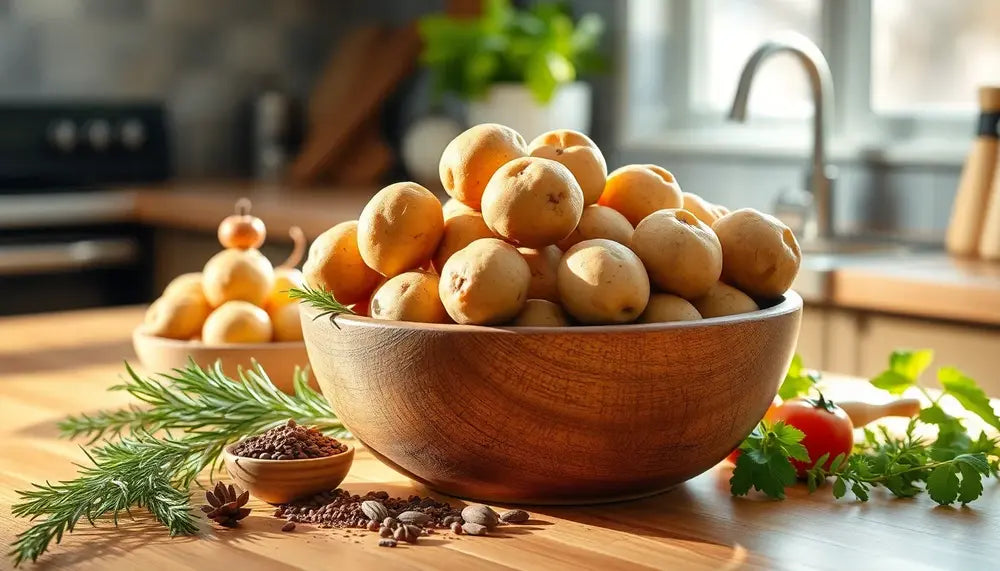The basics of a savory marinade for fried chicken
The **marinade** is the heart of every delicious fried chicken. Not only does it add flavor to the meat, it also ensures that it remains juicy and tender. A savory marinade is usually based on three main components: oil, Acid and spices. Oil helps distribute the seasonings evenly and lock in moisture in the chicken. Acid, such as lemon juice or vinegar, softens the meat slightly, resulting in a better texture while deepening the flavor. Spices and herbs are the protagonists that give the dish its unique touch.
To create a basis for a successful marinade, you should have a neutral, highly heatable oil such as rapeseed or sunflower oil, as these do not mask the properties of the spices. The choice of spices can vary depending on the desired flavor profile: from classic salt and pepper to more exotic blends with paprika, garlic powder and herbs such as rosemary and thyme.
Another important aspect is the ratio of acid to oil, which is usually around 1:3, depending on the acid strength and your own taste. A well-balanced ratio ensures that the chicken does not become too sour and the marinade offers a pleasant balance of flavors.
The exposure time is also crucial for the final result. For an optimal taste experience, the chicken should be marinated for at least an hour, but ideally overnight. This time gives the flavors of the marinade enough time to penetrate the meat and tenderize it.
Conclusion: A well-made marinade not only makes your roast chicken tastier, but also improves the texture of the meat. The key is choosing the right ingredients and having the patience to give the meat time to fully absorb the flavors.
Choosing the Best Seasonings for Your Roast Chicken
The selection of the spices plays a crucial role in the flavor of your fried chicken. Each spice brings its own distinctive flavor notes that can significantly influence the end result. When putting together the spice mixture for your marinade, you should consider the following aspects:
- Paprika: Provides a beautiful color and offers different flavor profiles depending on the variant (sweet, smoked, spicy).
- Garlic powder: Adds a savory depth that really comes into its own when combined with other spices.
- Thyme and rosemary: These herbs are classic companions for poultry and bring a fresh, aromatic element to the marinade.
- Black pepper: An essential spice that provides a peppery spiciness and enhances the flavor nuances of the other spices.
In addition to choosing individual spices, it is important to choose the right one Balance to find. Too many different flavors can be overwhelming and overwhelm the chicken's natural flavors. A combination of three to five main spices is recommended to achieve a harmonious depth of flavor.
It's worth experimenting with different spice combinations and also exploring regional or cultural spice blends, such as a Mediterranean blend or an oriental seasoning. Discover the diversity and be inspired by the countless options available to you.
Conclusion: The right selection and mix of spices can transform your fried chicken from an ordinary dish into an extraordinary culinary experience. Try different combinations to find the perfect balance for your taste.
Pros and cons of a hearty marinated fried chicken
| Advantages | Disadvantages |
|---|---|
| Intense taste thanks to selected spices. | May be too seasoned for those with sensitive stomachs. |
| The marinade keeps the meat juicy. | The preparation time including marinating is longer. |
| Improved texture and browning from the marinade. | Can easily burn when grilling due to sugar in the marinade. |
| The right combination of spices can make the meal a highlight. | Calorie and fat content may be increased due to additional ingredients in the marinade. |
Step-by-step instructions for preparing the marinade
Preparing a tasty marinade for your roast chicken is a simple process that involves the following steps:
- Measuring ingredients: Start by measuring the amounts of oil and acid needed, as well as the spices you choose. A general rule for mixing is to keep the ratio of oil to acid about 3:1.
- Mixing the liquids: Place the oil and acid in a large bowl. Use a whisk to mix both ingredients thoroughly until they form a homogeneous liquid.
- Adding the spices: Sprinkle the measured spices into the bowl. Stir the mixture again to make sure all the spices are evenly distributed throughout the liquid.
- Taste and Adjust: Taste the marinade and adjust seasonings as needed. This is the moment to perhaps add more acid for more freshness or more spices for a more intense note.
- Marinating the Chicken: Place the chicken pieces in a large, sealable plastic bag or bowl and pour the marinade over them. Make sure all parts are completely covered. Seal the bag or cover the bowl and place it in the refrigerator.
- Rest time: Let the chicken sit in the marinade for at least an hour, but ideally overnight for best results.
The steps are easy to follow and can be easily adjusted to tailor the marinade to your personal preferences. Once the chicken is marinated, you are ready to fry or grill it, where it will be full of flavors.
Conclusion: A well-prepared marinade is the key to a flavorful and tender roast chicken. With these simple step-by-step instructions you can ensure your chicken is perfectly marinated every time.
Tips for the perfect marinating time for tender chicken
The time your chicken spends in the marinade is crucial to the end result. Here are some tips to get that optimal marinating time to determine and thus maximize the tenderness and taste of the meat:
- Shorter marinating time for thin cuts: Chicken breasts or fillet pieces should not be marinated for too long as they can easily become over-seasoned or too soft. A marinating time of 1 to 3 hours is usually sufficient.
- Longer marinating time for thick cuts: Whole chickens or thicker cuts like legs can benefit from a longer marinating time. You can 4 hours to a whole night remain in the marinade to fully absorb the flavors.
- Ideal temperature for marinating: Always marinate the chicken in the refrigerator to ensure food safety. The cool temperature also helps the meat fibers absorb the marinade better.
- Avoiding Excessive Acidity: Too much acid can make the chicken tough after a long period of exposure. Make sure you get the right balance of ingredients, and if your marinade is very acidic, shorten the soaking time.
Following these tips will help you prepare perfectly marinated, tender, and juicy fried chicken every time.
Conclusion: The correct marinating time is crucial to the quality of your fried chicken. Adjust the time depending on the cut of meat and consider the specific characteristics of your marinade for optimal results.
Avoid common mistakes when marinating fried chicken
When marinating fried chicken, it's easy to make mistakes that will affect the results. Here are some common mistakes to avoid to prepare your chicken optimally:
- Using the wrong oil: Some oils, such as olive oil, have a low smoke point and are therefore less suitable for marinades used for frying or grilling. Instead, choose high-heat oils such as rapeseed or sunflower oil.
- Too much salt: While salt is an important flavor carrier, too much of it can dry out the meat. Stick to the recommended amount of seasoning and adjust as needed to avoid over-seasoning.
- Insufficient draining: Before cooking the marinated chicken, drain off any excess marinade. Too much liquid on the meat can both increase cooking time and reduce the chicken's ability to develop a crispy surface.
- Marinating times too long: Especially with acidic marinades, marinating for too long can make the meat tough and rubbery. Limit the marinating time depending on the thickness of the meat and the acidity of the marinade.
By avoiding these common mistakes, you can ensure your fried chicken is juicy, tender, and full of flavor every time.
Conclusion: Pay attention to the correct selection of ingredients, appropriate marinating time and correct preparation of the chicken before cooking to ensure the quality of your dish. Focus on details to ensure your marinade brings out the best in the fried chicken.
Variations of the fried chicken marinade for different tastes
The variety of marinades makes it possible to discover fried chicken again and again. Depending on your preferences and occasion, you can choose between different flavors to make your chicken a culinary highlight. Here are some variants of marinades that will suit every taste:
- BBQ marinade: Perfect for barbecue evenings. Combine BBQ sauce with a splash of apple cider vinegar, a little brown sugar, and garlic powder for a smoky-sweet flavor.
- Mediterranean marinade: Olive oil, lemon juice, crushed garlic, oregano and rosemary give the chicken a fresh, herbal flavor.
- Asian marinade: Soy sauce, sesame oil, ginger, honey and a touch of chili create a spicy and slightly sweet taste that goes well with Asian side dishes.
- Indian marinade: Yoghurt combined with tandoori paste, garlic, coriander and a pinch of garam masala offer an exotic, spicy taste journey.
These variations allow you to customize your fried chicken depending on your mood and taste. Experiment with the ingredients and find your personal favorite marinade.
Conclusion: A good marinade not only enriches the taste of the fried chicken, but can also build a bridge to various international cuisines. Take the freedom to experiment and discover new worlds of taste.
Cook the roast chicken properly for optimal flavors
Properly cooking fried chicken is crucial to fully bring out the marinade's flavors and ensure the meat is both tender on the inside and crispy on the outside. Here are some tips on how to best prepare your fried chicken:
- Preheat the oven: Make sure your oven is fully preheated before putting the chicken in. An ideal temperature is around 200°C (390°F).
- Placement on the grid: Place the chicken on a rack in a roasting pan or on a baking sheet. This allows the hot air to flow evenly around the meat and ensures crispy skin.
- How to use a meat thermometer: To ensure the chicken is perfectly cooked without overcooking, use a meat thermometer. The ideal core temperature for well-cooked chicken is 75°C (167°F).
- Cover if necessary: If the skin of the chicken browns too quickly, you can cover it with aluminum foil to prevent burning while the inside continues to cook.
- Rest time: After cooking, let the chicken rest for about 10 minutes. This helps to stabilize the juices in the meat so that it remains juicy when cut.
Following these tips will not only improve the flavor but also optimize the texture of your fried chicken, resulting in an overall better eating experience.
Conclusion: Correct cooking is just as important as a good marinade. Both elements together create a delicious, aromatic and visually appealing dish.
Serving suggestions and side dishes for marinated roast chicken
A perfectly marinated and prepared roast chicken is complemented by the right side dishes and an attractive presentation. Here are some serving suggestions and side dishes that will ideally complement your marinated fried chicken:
- Potato side dishes: Be it baked rosemary potatoes or creamy mashed potatoes, potatoes are classic companions for roast chicken. They absorb the flavors of the marinade and perfectly complement the dish.
- Fresh salads: A light, fresh salad of green leaves or a summer salad with tomatoes and cucumbers provides a pleasant contrast to the rich flavor of the chicken.
- Grilled vegetables: Vegetables such as zucchini, peppers and eggplant, lightly marinated and grilled, are excellent accompaniments that enhance the flavor of the roast chicken.
- Sauces and dips: A selection of dips such as BBQ sauce, aioli or a simple yogurt herb dip can further enrich the taste experience.
When presenting the dish, you can add small touches, such as sprinkling fresh herbs over the chicken or serving the dish on a color-coordinated plate to attract attention.
Conclusion: Choosing the right side dishes and an attractive presentation not only enhance the taste of the fried chicken, but also turn the meal into a real feast. With the right combinations, your marinade fried chicken will become an unforgettable dish.
Conclusion: Why a good marinade makes the difference
The right marinade can really make all the difference when it comes to transforming an average roast chicken into a culinary masterpiece. Not only is the flavor intensified, but the texture of the meat is also improved through the action of acid and spices.
Good marinades result in a deep flavor enrichment. They penetrate the meat and bring out complex flavors that simply seasoning on the surface cannot achieve. In addition, the acid contained in the marinade helps to partially break down the proteins in the chicken, making the meat more tender.
This chemical reaction highlights why marinating time is so important: it takes time to find the right balance between flavoring and tenderizing without the meat becoming too soft or losing its texture. The result is a succulent, aromatic dish that invigorates the senses and stands out from ordinary dishes.
Conclusion: Invest in a good marinade and give your roast chicken enough time to absorb it. It's worth it because the end product will not only pamper the taste buds, but can also easily become the highlight of any meal.
FAQ about whole chicken marinade
Which oils are best for a savory chicken marinade?
For hearty chicken marinades, it is recommended to use neutral, high-heat oils such as rapeseed or sunflower oil. These oils do not affect the flavor of the spices and ensure even distribution.
How long should the chicken sit in the marinade?
The chicken should be marinated for at least an hour. For an optimal taste experience, a marinating time of overnight is ideal, especially for larger chicken pieces.
Which spices are particularly suitable for a hearty marinade?
Spices such as paprika, garlic powder, thyme, rosemary and black pepper are particularly recommended for a hearty marinade. These spices add a depth of flavor and pair well with the chicken.
Can all parts of the chicken be marinated?
Yes, all parts of the chicken, including breasts, legs, wings, and even the whole chicken, can be marinated. The marinade helps keep the meat tender and juicy while it cooks.
What happens if chicken is marinated for too long?
If chicken is marinated for too long, especially in a very acidic marinade, the meat can begin to break down and take on a rubbery texture. A marinating time that is too long can also cause the spices to dominate and mask the natural flavor of the meat.





Share:
Crispy cauliflower from the oven with herb marinade
Crispy delicacies: marinades for tender turkey schnitzels